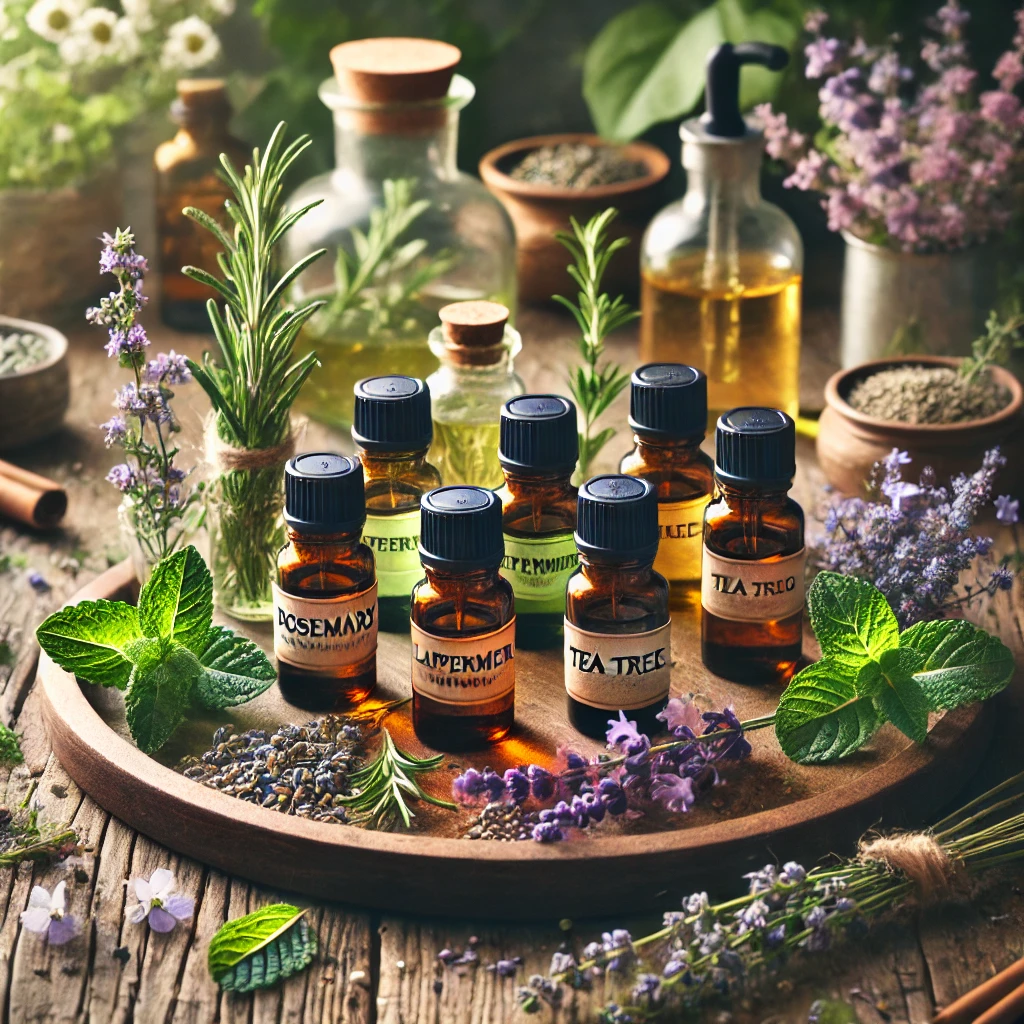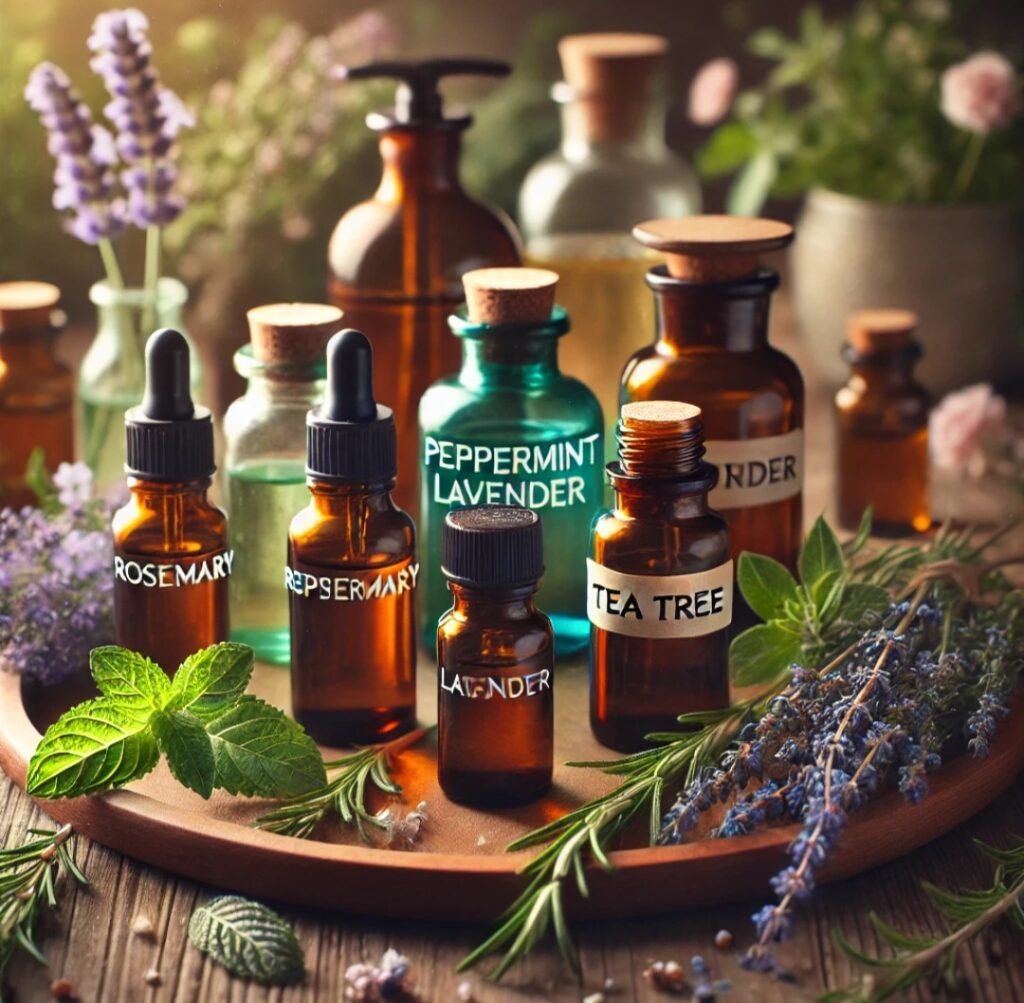Essential Oils for Hair Growth: A Comprehensive Guide
What essential oils are good for hair growth?
Are you looking for essential oils for hair growth, than here is a comprehensive guide for hair loss or slow hair growth. These are common concerns that affect people of all ages.
While there are various treatments available, but alot of people are turning to natural remedies like essential oils for hair growth.
These natural oils, derived from plants, are not only known for their aromatic smell, but also for their potential to stimulate hair growth.
So, in this article, you will explore the best essential oils for hair growth, and their benefits, how to use them, and the science behind their effectiveness.
Introduction to Essential Oils and Hair Growth
Well, essential oils are extracts that capture the plant’s scent, flavor, and beneficial properties.
For centuries, these oils have been used in various cultures for medicinal, therapeutic, and cosmetic purposes.
In recent years, their popularity has surged in the beauty industry, particularly for hair care.
Hair growth can be influenced by various factors such as genetics, diet, stress, and hair care practices.
Essential oils can address some of these factors by improving scalp health, increasing blood circulation, and providing essential nutrients that promote hair growth.

How Essential Oils Promote Hair Growth
- Stimulating the Scalp: Essential oils like peppermint and rosemary are known for their ability to stimulate blood circulation in the scalp. Improved blood flow ensures that hair follicles receive more nutrients and oxygen, promoting healthier and faster hair growth.
- Strengthening Hair Follicles: Oils such as cedarwood and lavender help strengthen hair follicles, making them less prone to breakage. Strong hair follicles are crucial for maintaining hair density and reducing hair thinning.
- Balancing Scalp Oil Production: Some essential oils, like tea tree and lavender, have antimicrobial properties that can balance the scalp’s oil production. This prevents the clogging of hair follicles, which can lead to hair loss.
- Reducing Inflammation: Inflammation of the scalp can hinder hair growth. Essential oils with anti-inflammatory properties, such as chamomile and eucalyptus, soothe the scalp, creating an environment conducive to hair growth.
- Fighting Dandruff and Scalp Conditions: Dandruff and other scalp conditions can block hair follicles and slow down hair growth. Essential oils like tea tree and lemongrass have antifungal properties that help combat these issues, promoting a healthier scalp.
Top Essential Oils for Hair Growth
- Rosemary Oil
- Benefits: Rosemary oil is one of the most popular essential oils for hair growth. It stimulates blood circulation, strengthens hair follicles, and has antioxidant properties that promote hair health.
- Usage: Mix a few drops of rosemary oil with a carrier oil like coconut or jojoba oil and massage into the scalp. Leave it on for at least 30 minutes before washing it out.
- Peppermint Oil
- Benefits: Peppermint oil has a cooling effect that increases blood circulation in the scalp, encouraging hair growth. It also has antimicrobial properties that help maintain scalp health.
- Usage: Dilute peppermint oil with a carrier oil and apply it to the scalp. It can also be added to your shampoo or conditioner for regular use.
- Lavender Oil
- Benefits: Lavender oil is known for its soothing properties and its ability to balance the scalp’s oil production. It also helps in improving blood circulation and promoting hair growth.
- Usage: Mix lavender oil with a carrier oil and massage into the scalp. It can be left on overnight for better results.
- Cedarwood Oil
- Benefits: Cedarwood oil is believed to promote hair growth by balancing the oil-producing glands in the scalp. It also has antifungal and antibacterial properties that can treat conditions leading to hair loss.
- Usage: Combine cedarwood oil with a carrier oil and massage it into the scalp. It can also be added to your shampoo.
- Tea Tree Oil
- Benefits: Tea tree oil has powerful cleansing, antibacterial, and antimicrobial properties. It helps unclog hair follicles and nourish your roots, making it an excellent choice for treating dandruff and promoting hair growth.
- Usage: Dilute tea tree oil with a carrier oil and apply to the scalp. You can also add a few drops to your shampoo or conditioner.
- Chamomile Oil
- Benefits: Chamomile oil is known for its calming effects, but it also nourishes the scalp and promotes hair growth. It reduces scalp inflammation and makes the hair shiny and soft.
- Usage: Add a few drops of chamomile oil to your conditioner or dilute it with a carrier oil and massage it into your scalp.
- Thyme Oil
- Benefits: Thyme oil helps promote hair growth by stimulating the scalp and actively preventing hair thinning. It also has antifungal properties that help maintain a healthy scalp.
- Usage: Thyme oil is potent, so it should be used sparingly. Mix it with a carrier oil and apply it to the scalp, leaving it on for 10-15 minutes before washing it off.

How to Use Essential Oils for Hair Growth
Using essential oils for hair growth is simple, but there are some key points to keep in mind:
- Dilution is Essential: Essential oils are highly concentrated and should not be applied directly to the skin. They should be diluted with a carrier oil, such as coconut oil, jojoba oil, or almond oil, before application. A typical dilution ratio is about 3-5 drops of essential oil per tablespoon of carrier oil.
- Scalp Massage: Massaging the scalp with essential oils can significantly enhance their effectiveness. A gentle scalp massage boosts blood circulation, ensuring that the nutrients from the oils reach the hair follicles.
- Consistency is Key: For best results, use essential oils regularly. Depending on your hair care routine, you can apply the oils 2-3 times a week. Be patient, as natural remedies take time to show results.
- Patch Test: Before using a new essential oil, perform a patch test to ensure that you don’t have an allergic reaction. Apply a small amount of the diluted oil to your inner arm and wait 24 hours to see if any irritation occurs.
- Adding to Hair Products: Essential oils can be added to your regular shampoo, conditioner, or hair mask. This is an easy way to incorporate them into your hair care routine.
The Science Behind Essential Oils and Hair Growth
While anecdotal evidence and traditional usage support the effectiveness of essential oils for hair growth, scientific studies are also beginning to back these claims.
- Rosemary Oil: A 2015 study compared the effectiveness of rosemary oil to minoxidil, a common hair growth treatment. The study found that rosemary oil was just as effective as minoxidil in promoting hair growth, with fewer side effects like scalp itching.
- Peppermint Oil: A 2014 animal study showed that peppermint oil significantly increased hair growth by promoting the growth of dermal papilla cells, which play a crucial role in hair formation.
- Lavender Oil: Research in 2016 demonstrated that lavender oil could improve hair growth in mice. The study found that lavender oil increased the number of hair follicles and deepened hair follicle depth.
These studies suggest that essential oils may offer a natural and effective way to promote hair growth, though more research is needed to fully understand their mechanisms.
Conclusion
Essential oils provide a natural, safe, and effective method for promoting hair growth and improving scalp health. With consistent use, oils like rosemary, peppermint, and lavender can strengthen hair follicles, stimulate circulation, and create a healthy environment for hair to grow. Whether you are dealing with hair thinning or simply looking to enhance your hair’s natural growth, incorporating essential oils into your hair care routine could be a beneficial step.
However, it’s important to remember that results vary from person to person, and what works for one individual may not work for another. Patience and consistency are key, and it’s always a good idea to consult with a healthcare provider or dermatologist before starting any new hair treatment regimen.

Leave a Reply